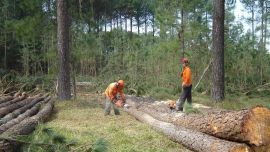President Evo Morales called for new elections Sunday evening, but hours later the commander of the Armed Forces asked him to resign "for the good of our Bolivia."
Events in Bolivia have escalated dramatically over the last 48 hours after an OAS audit found serious irregularities in elections last month that gave the leftist leader a fourth term.
Speaking Sunday, Morales, Bolivia's first president of indigenous descent, promised new elections under the direction of a revamped Supreme Electoral Tribunal in a televised address. But he did not say whether he would run again.
With no sign of violent protests abating, the commander-in-chief of the Armed Forces, General Williams Kaliman, told reporters he was asking Morales "to resign his presidential mandate."
"After analysing the conflicted domestic situation, we ask the president to resign his presidential mandate to allow for pacification and the maintaining of stability, for the good of our Bolivia," General Williams Kaliman told reporters.
Speaking on national television, Kaliman also appealed to Bolivians to desist from violence. He added that the Armed Forces had ordered "military operations in the air and on land to neutralise Armed groups that are acting outside the law."
The commander of the police, General Vladimir Yuri Calderon, also called on Morales to step down.
There were signs of disarray among Morales supporters, with the head of the lower Chamber of Deputies and the ministers of mines and of hydrocarbons announcing their resignations. Two of those resigning cited risks to their families after mobs attacked their respective houses in the city of Potosí.
Protests have flared across Bolivia since Morales was declared the winner of the October 20 election, beating his nearest rival, centrist Carlos Mesa, by just enough to avoid a second round.
OAS report
Buckling under mounting pressure, Morales had earlier in the day called for a new election. South America's longest-serving leader made the announcement after a preliminary report by the Organisation of American States found a "heap of observed irregularities" in the October 20 presidential contest and said a new vote should be held.
An audit of the election found "irregularities that range from serious to indicative," in virtually every area reviewed -- in the technology used, the chain of custody of ballots, the integrity of the count, and statistical projections.
"This leads the technical auditing team to question the integrity of the election results," the report on their preliminary findings said.
OAS Secretary General Luis Almagro said the results giving the leftist leader a fourth term in office "must be annulled and the electoral process must begin again."
The unrest that has left three people dead and over 100 injured in clashes between supporters and opponents of Morales represents the biggest crisis in the socialist leader's nearly 14 years in power.
"We all have to pacify Bolivia," Morales said in announcing plans to replace the nation's electoral tribunal and urging the country's political parties to help bring peace.
Luis Fernando Camacho, a protest leader from the eastern city of Santa Cruz who has become a symbol of the opposition, said the OAS report clearly demonstrated election fraud.
“Today we won a battle,” Camacho said at a protest. “Only when we can be sure that democracy is solid, then will we go back home.”
"The battle has been won," said Waldo Albarracín, a public defender and activist. "Now, the duty is to guarantee an ideal electoral tribunal."
Resignations
Adding to the crisis, two government ministers in charge of mines and hydrocarbons, as well as the Chamber of Deputies president and three other pro-government legislators announced their resignations. Some said opposition supporters had threatened their families. Also Sunday, the Attorney General's Office said it will investigate judges on the Supreme Electoral Tribunal for alleged fraud following the OAS report.
The man Morales claimed to have defeated, opposition leader and former President Carlos Mesa, said the OAS report showed "monstrous fraud," and he added that Morales "can't be a candidate in new elections."
Morales did not say whether he will run again.
"The priority is to choose a new electoral tribunal and figure out when we'll have the new elections," he told local radio Panamericana.
Morales, 60, became the first president from Bolivia's indigenous population in 2006 and presided over a commodities-fed economic boom in South America's poorest country. The former leader of a coca growers union, he paved roads, sent Bolivia's first satellite into space and curbed inflation.
But some who were once excited by his fairy-tale rise have grown wary of his reluctance to leave power. He ran for a fourth term after refusing to abide by the results of a referendum that upheld term limits for the president. He was able to run because Bolivia's constitutional court disallowed such limits.
After the October 20 vote, Morales declared himself the outright winner even before official results indicated he obtained just enough support to avoid a run-off with Mesa. A 24-hour lapse in releasing results fuelled suspicions of vote-rigging.
Police guards outside Bolivia's presidential palace abandoned their posts Saturday, increasing pressure on President Morales.
Officers also climbed onto the roof of a nearby police station holding Bolivian flags and signs proclaiming "The Police with the People." Police retreated to their barracks in at least three cities, and there were reports that some in two cities were openly declaring mutinies.
The president, who was not at the palace at the time and appeared later at a military airfield outside La Paz, urged police to "preserve the security" of Bolivia and obey the rules.
– TIMES/AP/AFP


























Comments